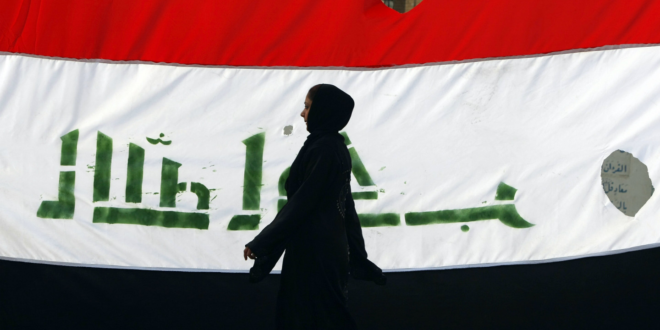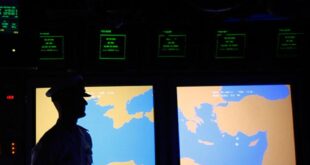Iraq is a key hub allowing Iran access to the international financial system, but the US is turning up the pressure on the country’s banking system.
The US is tightening its maximum pressure grip on Iran by focusing on one of the key hubs that allows Tehran access to the international financial system: Iraq.
In the latest wave of tightening financial measures, Washington targeted public and private Iraqi lenders facilitating Iranian access to international financial markets.
US pressure on the Iraqi banking system is hard to overstate, with 34 of the 44 private banks in Iraq under sanctions, leaving ten lenders with full access to the banking system.
Regional analysts estimate that Iraq facilitates and effectively launders $300 million of Iranian capital a day.
A Reuters report in February suggested that more private lenders will follow should the Central Bank fail to rein in capital flows to Iran. The Central Bank of Iraq itself could be subject to US sanctions.
The banking system is central to a broader Iranian nexus of influence in the country. Many of the lenders appear to be handling the payroll, supplies, and financial transactions of Iran-backed paramilitary groups and militias. They also help Iran to do its business far from US sanctions.
As a result, many leaders of political groups across the political spectrum in Iraq are involved in lucrative business with Iran and are not willing to give up these benefits so easily. This puts added pressure on the Iraqi government when implementing reforms that would halt these kinds of interactions.
The scope of this trade has expanded beyond Iran to include cooperation with Turkey, Lebanon, and Syria. According to some sources, the volume of Turkish money laundering in Iraq is at least four times that of Iran.
According to Iraqi banker Abed Rab al-Heidari, Iraqi lenders are not merely involved in money laundering on behalf of Iranian individuals and groups, but also Turkish, Syrian, and Lebanese individuals.
This phenomenon is predicated on political protection, but under pressure from Washington, the government is willing to combat money laundering and implement the necessary reforms. There is political pushback, however, as many parties are tied to this financial system, particularly militias.
“The armed groups are fundamentally unwilling to accept any Iraqi government directive or limit the scope of their activity,” al-Heidari told The New Arab.
The banker highlighted the case of an individual detained and sentenced to life imprisonment for money laundering and capital transfers from Syria to Iraq. Following political pushback, his sentence was commuted to 15 years.
The problem with Iraqi lenders
What distinguishes Iraq’s trade with Iran is its disregard for the US dollar ban imposed on Iran. US Secretary of State Marco Rubio told Iraqi Foreign Minister Fuad Hussein that Iraq may continue energy imports from Iran, but cannot give the Iranians a single dollar.
Iraqi financial analyst and banking consultant, Mustafa Hantoush, points out that Baghdad’s failure to disrupt Iran’s access to dollar markets is a distinctly Iraqi challenge.
A string of countries across the Levant and West Asia have been engaging in financial transactions with Iranian individuals or entities. The UAE facilitates payments in goods, Oman allows remittances, and Turkey allows trade in gold. Iraqi lenders facilitate dollar transactions, making the country irreplaceable for Iranian capital markets.
“The continued misguided approach of the Central Bank will lead to financial turmoil, which, coupled with potential US sanctions, could spell disaster for the Iraqi banking system and government,” Hantoush told TNA.
The Trump Administration is responsive to calls for sanctions articulated by US Treasury officials and is moving to target Iraqi lenders and, significantly, individual managers and shareholders.
Banking sources told the Iraqi news platform Al-Sa’a that “the sanctions will target the individual owners of at least one of the five private lenders accused of being the banking arm of a militia”.
A key campaigner for this course of action is Republican Congressman Joe Wilson, who has targeted Iraq’s biggest lender, the Rafidain Bank, in a string of social media posts.
Speaking on condition of anonymity, a member of the ruling ‘Coordination Framework’ parliamentary coalition suggested to TNA that Wilson’s criticism is valid: shadow banking elicits the complicity of all Iraqi political factions, Sunni, Shia, and Kurdish.
Choking Iraqi banking
To date, the Central Bank of Iraq denies an immediate threat of sanctions while confirming consultations with US Treasury Department officials in the United Arab Emirates. In principle, it is committed to monitoring foreign transfers and dollar cash sales to prevent money laundering.
Washington’s pressure is mounting, moving from private to state-owned lenders, including the Rafidain Bank, the Rashid Bank, the Trade Bank of Iraq, and other specialised institutions focused on agriculture and industrial portfolios, which could threaten economic stability in the country.
Between US regulatory pressure and Iranian-backed militia pushback, Iraq is seeking a resolution via the consolidation of the banking sector. Abiding by International Monetary Fund (IMF) instructions, the government is considering the merger and restructuring of state-owned lenders implicated in money laundering and sanctions evasion.
Initially, the Central Bank of Iraq had been leaning on private lenders to contain the escalation of US sanctions. In February, Iraq’s Central Bank barred five private lenders from engaging in US dollar transactions: Al-Mashreq Al-Arabi Islamic Bank, United Bank for Investment, Al Sanam Islamic Bank, Misk Islamic Bank, and Amin Iraq for Islamic Investment and Finance. This adds to a previous list of eight Iraqi banks hit by similar sanctions in 2024.
Iraq’s response is to merge and restructure state lenders, clearing their portfolios.
“The truth is that most of these Iraqi lenders do not have foreign partners, are bankrupt or on the verge of bankruptcy,” according to Youssef Mohammed Hassan, a member of the Iraqi Presidential Law Committee, an advisory body that reviews the constitutionality of legislation. These banks include the state-owned Rafidain and Rashid banks.
According to Mohammed Hassan, Iraq has made restructuring, consolidation, and the cleaning up of problematic asset ledgers conditional on IMF and World Bank supervision. The die is cast.
 Eurasia Press & News
Eurasia Press & News




